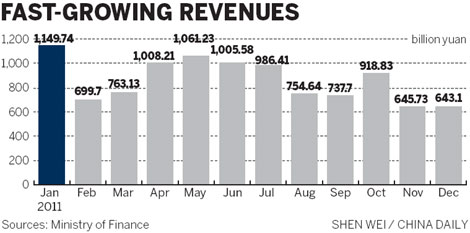Fiscal income hit a record in 2011
 0 Comment(s)
0 Comment(s) Print
Print E-mail
China Daily, January 21, 2012
E-mail
China Daily, January 21, 2012

China's fiscal income hit a record 10.37 trillion yuan ($1.64 trillion) in 2011, 25 percent higher than in the previous year, the Ministry of Finance said on Friday.
Experts suggested the fast-growing revenue would allow more room for tax cuts this year and finance a fiscal stimulus to help the world's second-largest economy avoid a hard landing.
According to a statement on the website of the Ministry of Finance, nationwide fiscal revenue jumped 24.8 percent in 2011 year-on-year, with tax revenue contributing 8.97 trillion yuan.
Full-year fiscal expenditure was 10.89 trillion yuan, an increase of 21.2 percent from 2010, leaving the country with a fiscal deficit of 519 billion yuan, or 1.1 percent of its GDP.
The strong growth in 2011 revenue, much higher than the budgeted 8 percent, was attributed to China's economic gains, surging prices and corporate profits, the ministry said.
Revenue from corporate income taxes rose 30.5 percent in 2011, while value-added taxes and tariffs also rose rapidly.
Personal income taxes jumped 25 percent in 2011, but the ministry noted that revenue from personal income tax fell 5.5 percent in the last quarter of the year after the tax threshold was raised on Sept 1.
The growth in fiscal revenue also slowed over the year, from 33 percent in the first quarter to 10 percent in the fourth, as economic expansion moderated and inflation eased.
Some analysts warned that the slower increase may pose a challenge to the government's plans for further tax cuts and aggressive fiscal stimulus spending.
A stimulus on the scale of the 4 trillion yuan package in 2008, implemented to counter the global financial meltdown, will not be repeated, but China needs to maintain a fiscal deficit on a certain level as spending demand rises in a number of areas, said Liu Shangxi, deputy head of the research institute for fiscal science affiliated to the finance ministry.
According to the statement, fiscal expenditure on education jumped 28.4 percent in 2011, while healthcare spending was up 32.5 percent and transport rose by 36.1 percent.
Spending on affordable housing saw an increase of 60.8 percent as the government launched a nationwide campaign to build millions of new apartments for the low-income groups.
But spending on "energy efficiency and environment protection" rose by just 7.2 percent.
Meanwhile "there will be no tax cuts on a massive scale, just structural tax reduction targeting at certain fields", said Liu.
The growth in fiscal revenue is likely to fall 10 percent next year, Liu said.
However, others argued that the authorities must narrow the gap between fast-growing fiscal revenue and the relatively low national income, and will have to spend "smartly" in future fiscal stimulus.
"The statistics on fiscal revenue don't include revenue from land sales, administrative penalties or legal fees, yet the revenue is still growing much faster than the national income," wrote Ma Guangyuan, a financial commentator, in his micro blog.
After adjustment for inflation, fiscal revenue grew 19.4 percent in 2011, more than twice as fast as the 9.4 percent growth in national income, according to Qu Hongbin, chief China economist at HSBC Holdings.
"As long as the uneven distribution of income continues, the government's ambition to boost domestic consumption and adjust the economic structure is like a castle in the air," Qu said.






Go to Forum >>0 Comment(s)